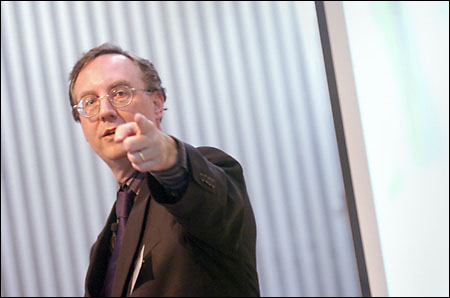Looking at Iraq, Cole sees glass that’s half empty
Administration critic warns of factionalism

A University of Michigan historian and outspoken foe of Bush administration Middle East policy painted a decidedly pessimistic picture of the future of Iraq in a public address on Friday (April 22), arguing that “sub-nationalisms” along ethnic and religious lines are proving to be as durable in Iraq as the idea of Iraqi national identity.
Speaking as the public keynoter of a two-day conference (April 22-23) on “Religion and Nationalism” at Harvard Divinity School (HDS), Juan Cole acknowledged that his topic – the rise of religious and ethnic mass politics in Iraq – was an example of “trying to capture some history on the run.”
Cole argued that ethnic divisions in the area predated the creation of modern Iraq and were now on full display in the January 30 elections that were split along ethnic lines of majority Shiites and minority Sunnis and Kurds.
“Despite the denial that my [lecture] subject exists, it does exist,” Cole said, referring to scholars and analysts whom he claimed downplay ethnic and religious divisions in the country. He went on to assert that sectarian tensions within Iraq are now the norm.
Cole said he was not necessarily predicting that Iraq will experience a civil war, but he did say present trends – including ongoing violence between members of different ethnic groups – do “not bode well for national unity.”
“There was no Iraq in the 19th century,” said Cole, noting that the creation of what had previously been three provinces into a single grouping only occurred under British rule following the downfall of the Ottoman Empire in World War I. Iraq, as an independent state, did not come into being until 1932 after Britain had to acknowledge, Cole said, that it could not control the territory it had created.
A modern sense of nationalism as understood in the West has made it difficult, Cole opined, to understand the ethnic and religious complexities within the territory now called Iraq.
In bringing his argument to the current moment, Cole said that while the United States portrayed Iraq under Saddam Hussein as a totalitarian state, it was, he contended, “rather ramshackle” during the final years of Hussein’s regime, adding that it did not take long for political parties formed along ethnic and religious lines to begin grassroots organizing after the fall of the Ba’th Party government.
When asked if it might be better if Iraq split or partition itself into separate areas, Cole said he would be reluctant to tell Iraqis what to do – “there’s been enough of that already,” he said, citing Iraq’s colonial past – but did argue that separation would not likely work because those of different identities are spread out throughout the country: Not all Iraqi Kurds, for example, are in the Northern part of the country.
“There would be massive ethnic cleansing,” he predicted. “It would be a horrible thing.”
A federation that could involve the Kurds having some degree of autonomy might work, but a lot “could still go wrong,” Cole said.
Cole’s speech was a public keynote address of a two-day symposium sponsored by the Center for the Study of World Religions (CSWR) at HDS and was the final event in a year-long series focusing on the role of religion in international conflicts.
The objective of the symposium, said HDS Professor David Little, was to explore “whether any lessons concerning the causes and possible resolution of ethnic and religious conflict in places like Bosnia, Sri Lanka, and Sudan can be drawn and be of help in regard to the situation in Iraq.”
“It’s a comparative conference,” Little said prior to the event, with conference participants examining the degree to which ethnic and religious factors have played a role in conflicts and addressing the ways such conflicts can be resolved.
Some 25 scholars participated in the event. A symposium volume will be produced from the conference, Little said.




